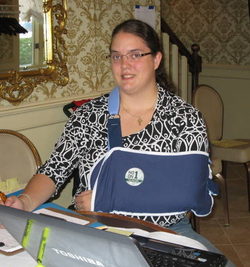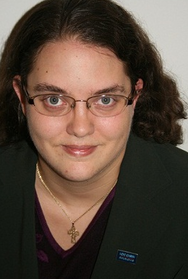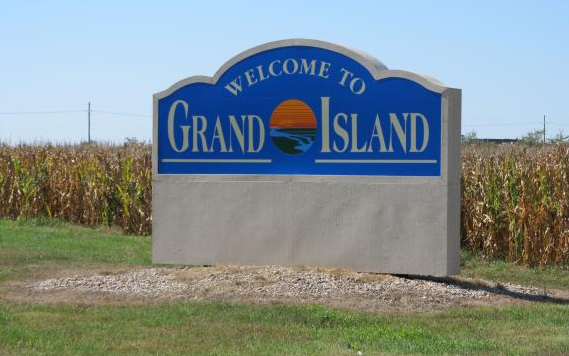|
Grand Island, Nebraska is home to about 50,000 Nebraskans and a steaming pile of homo-hatred. The city council recently rejected an ordinance that would have prohibited discrimination on the basis of sexual orientation. Not only that, but they rejected a proposal that would have put the decision in front of the voters, instead voting 8-2 that denying someone a promotion because of who they love is a-OK. As if that wasn't bad enough, one of the council members explained that he didn't want Grand Island to become "gay-friendly." Riiiight. Like all the queers were suddenly going to flock to Nebraska if this thing passed.
So I have an idea. I would LOVE to mess with them by showing them how doggone gay Grand Island can be. If you're in Nebraska (or anywhere near it), I would LOVE for you to drive to Grand Island and do or put something super gay and rainbow-y in front of their stupid-looking "welcome" sign. In fact, I would love to do this for ANY city that's passed anti-gay ordinances, or that has refused to pass laws giving --gasp!--equal rights to LGBTQ folks. I'm sure there are a whole bunch of other cities we can target. What are they? And should we plot to get back at them by fomenting a big ol' pro-gay movement with them at the center of it? E.g., Grand Island is for (Gay) Lovers? What do you think?
9 Comments
I feel like it would be virtually anti-American not to say anything about the presidential debate, but for me it hovered between depressing and irritating. The substance centered around giant economic plans whose conception--let alone implementation--is opaque to practically all of us. Would most people know the difference if Obama had said Romney favored cutting $8 trillion in taxes instead of $5 trillion? Or if Romney had said Obama planned to cut $416 billion from Medicare instead of $716 billion? Numbers that huge are difficult for most of us to assess unless we've got special expertise and/or gobs of free time. Instead, we assume that the candidate we favor is mostly telling the truth, while the other guy is spinning it somehow. Candidates vaguely reference "studies," but never go beyond that. Are there really "six studies" debunking Obama's critique of Romney's tax plan? At most, you might Google it (whereupon the sketchiness of Romney's citation becomes apparent). But even when you learn that the studies were conducted with biased motives, how do you know they're not accurate? Are you going to go read them and assess their validity? Am I? The debate format--with its time constraint, vague questions, unwieldy numbers, and dearth of precise follow-ups--makes it very difficult to see who's telling the truth. If you're like me, you end up relying on trusted sources, or on your own assumptions about the candidates, or on the candidates' values as best you can discern them. And this is where Obama could have scored big, I think--turning the topics into questions of values rather than questions of numbers. Gay rights, women's rights, Romney's "47 percent" gaffe--these issues underscore crucial value differences between Obama and Romney. And voters understand values; we have them, too. And since values underpin specific economic proposals, if we only have 90 minutes I'd rather hear about values. Instead of talking about my other reactions to the debate, which will depress you and me both, here are my reactions to the debate I wish I'd seen:
Did you watch the debates last night, dear readers? What did YOU think? I'm looking forward to your comments.  "Sure, I'm for gay rights, but I'm voting for Romney." "I don't agree with him on gay marriage, but overall, I agree with his values." "Gay rights is just one issue; I'm looking at the whole picture." Each time I hear a statement like this, it irks me anew. But why? Do I really think my right to get married is more important than homelessness, health care, or the economy? Geez, I don't think so. But even if I didn't disagree with Romney on these issues, I'd have a hard time voting for him. The crux of the problem is that for me, gay rights isn't "another issue," but a prior question--that is, a question that has to be answered before another one can be asked. For example, if I ask, "What kind of cookies should we make?" I've already answered (or implied the answer to) the prior question of: "are we going to make cookies?" To discuss issues with someone, I have prior questions. A central one is: are we equals? I am using "equals" in the sense of people who see each other as people, discussing and exchanging ideas--in the "all people are created equal" sense. Does the person value me and consider me valid as a human? To me, someone who does not believe in equal rights for gays and lesbians sees me (and/or my behavior) as subhuman. They do not believe that my full, real self is equal to their full, real self. They do not see me and my life the same way they see themselves and their lives. For this reason, the answer to the prior question of whether this is a person with whom I can engage in rational debate is "no." If you don't see me as your equal in terms of the human rights I deserve, it's very, very difficult for me to think you're worthwhile to engage with about anything else. This doesn't mean that someone needs to think I'm awesome, or love my choices. I think some people make terrible choices or are cruel people. But this doesn't mean I think they deserve fewer rights than I do. I dislike people who objectify women, but I would not favor a constitutional amendment that denied them the right to get married or prevented their partners from getting health care. And this, dear readers, is why gay rights isn't "just another issue" for me. Is it for you? Have you ever heard people say the things I quoted at the beginning of this post? How did you respond? Hi friends! Sorry for the kinda-long absence. My ADD-addled brain has been preoccupied with a number of things the past few weeks, including but not limited to: 1. Finishing a profile for one of my jobs; 2. Propagating succulents; 3. Doing a big around-the-house project with my DGF; 4. Taking a bunch of photographs for a website for one of my other jobs; 5. Undergoing massive amounts of career-related identity crisis. Anyway, I'm back now (yay! I missed you!) and was wondering what you all thought about the following topic: When, if at all, is separation based on sex ideal/necessary? First, a few caveats. Let's acknowledge that this question is inherently problematic: cissexist, falsely essentialist, and denies the experience of intersex people. It assumes that sex is a dichotomy, which it is not. (Also, note that I'm talking about sex, not gender.) So, I'm curious: What do you think about separation based on sex in the following scenarios? And why? When do you think that sex (or gender) separation is necessary and/or ideal? Would you be happier in a world with no sex separation?
If you're like me, you think that the Republican Party's stance on civil rights issues makes lesbianism as compatible with Republicanism as horseradish is with chocolate. But the Log Cabin Republicans disagree. They're a national organization of openly gay GOP members who want to strengthen the Republican Party, limit government, promote free markets, and advocate for LGBT equality. Intrigued, I contacted Log Cabin and asked for an interview with a member. I soon heard back from Casey Pick, Programs Director at the organization's national office, who is an out butch lesbian. She graciously agreed to an IM interview for BW, which I've printed here (edited only for length and clarity). Unless otherwise specified, her answers are hers alone and not that of the Log Cabin Republicans.  Pick in action, undeterred by injury BW: Thank you so much for agreeing to talk to me. I really appreciate your time. CP: Absolutely. I enjoyed reading your blog earlier, so I've been looking forward to this. BW: Thanks for reading! I'd love to start by asking a little about you. You're in your late 20s, and a graduate of UCLA Law School, is that right? CP: That's correct. I'm a proud Bruin, and a licensed attorney in the state of California. Now I'm the programs director for the National Log Cabin Republicans. BW: Have you been a Republican since you were young? CP: No, I became a Republican in college, shortly after the 2004 elections. That's quite a story. BW: I'd love to hear it. I was guessing that you've always identified as Republican, then came out later in life as a lesbian. CP: I'd always been pretty moderate, but sort of a "Democrat by default," especially after I realized my orientation in high school. But when I went to college at Claremont McKenna, I started to really define my political views, discovering that I was much more of a national security hawk--I was strongly affected by the 9/11 attacks--and that I really did believe in a free market and conservative political philosophy. BW: That's interesting. CP: But still, I was more concerned about gay rights than party politics, so I didn't make the change until two big things happened. CMC invited Patrick Guerriero, then Executive Director of Log Cabin Republicans to speak, and I really admired the work he was doing to change the party from within. The second thing was when I watched Democrats, after losing in 2004, start blaming Kerry's loss on LGBT people, and talking about how the Democratic Party needed to get in with religious voters.  Casey Pick in her lez-baru BW: What was the political climate like at Claremont McKenna? CP: CMC is a special place. It is one of the only schools I know of where the student body splits pretty evenly into liberal/conservative/independent, and we've been called the most political campus in the country. Add to that a really strong emphasis on leadership and studying government, and you have a politics wonk's dream! BW: Did you grow up in California? CP: I was born in CA and lived there until my mother decided to go to law school when I was 10 or so. We moved to Iowa, but I kept going back to CA during the summer, so it never really stopped feeling like home. BW: I bet you miss it! CP: I do! I've got plane tickets in hand for a trip to Palm Springs this summer, actually. BW: So when you began to ID with a conservative political philosophy, did you feel tension between your sexual orientation and new political leanings? CP: Given that it was 2004, and I had just watched 11 states pass constitutional amendments banning marriage equality, I knew there was work to be done in the GOP. It was very important to me, knowing that I was a conservative at heart--and also a newly born-again Christian... it was an intense time - it was important that I use my ability to speak, Republican-to-Republican, evangelical-to-evangelical, in order to change hearts and minds for equality. I was going to be a Republican, but I wasn't going to abandon my pro-equality principles at the door. And frankly, I believe the GOP's core principle of freedom and individual liberty is entirely in line with LGBT equality. BW: Did your Christian beliefs cause any tension re: your sexual orientation? CP: I became a Christian after really getting to know and love some of my evangelical neighbors at CMC, so they knew I was gay and welcomed me from the start. I will say that my orientation, and a long fear of Christians/God, made it harder to accept my faith, but now I reconcile the two happily, and enjoy helping others do the same. It's a theme in my life - I like to be a bridge. BW: I agree that freedom and individual liberty is in line with LGBT equality. But I'm skeptical of the idea that freedom and individual liberty are in line with the Republican agenda. Economic freedom and deregulation, yes. Social freedom, no. CP: Well, there are many Republicans who believe, as Vice President Dick Cheney said, "freedom means freedom for everyone" - and on issues like LGBT liberty, more Republicans are coming on board every day. BW: More may be coming on board. But in absolute numbers, it still seems low compared to Democrats. CP: The LGBT community has spent a long time investing in and educating the left side of the aisle. I find it unfortunate that we've conceded territory on the right for so long that now Democrats sometimes take our votes for granted. Log Cabin Republicans is working hard to do much of that same work on the right, and it's bearing results - I'd point to important votes on "Don't Ask, Don't Tell" repeal, or to marriage in NY, WA and NH as examples of where hard work pays off. BW: But if the Republican Party really believed in getting out of our personal lives, wouldn't they be totally accepting of LGBTQ folks? CP: We have to remember that the movement for LGBT equality, slow as it may seem, has actually moved very fast. As a matter of political philosophy, conservatives tend to be more cautious of social change in general, and the reality is that a large portion of this nation is still coming to grips with what it means for gay people to be out, proud, and forming families. BW: But if conservatives supposedly care about personal freedom, why do they tend to be cautious about social change? CP: A lot of times, what is marketed as change - as in, say, a "hope and change" agenda - is really about giving government more control. At the same time, it's about the law of unintended consequences - if we change this, what happens next that we can't see? This is the academic, geeky butch coming out in me - it's Burke, Hayek, that kind of political philosopher that says beware radical changes, and to a lot of folks, LGBT rights still seem radical. But as people learn that we're just like them, interested in going to work, raising our families, sometimes serving our nation in uniform - the more they learn that, the less radical we seem and the more progress we make among conservatives. BW: The fact that we have to "convince" Republicans that we're "just like them" suggests to me they DO care about getting into our personal lives. CP: It isn't so much about your personal life as about what society looks like as a whole. Conservatives often believe that a self-governing society, one which can maintain a high level of freedom, requires strong families and other private institutions to provide stability. BW: The values you're articulating sound more Libertarian than Republican. CP: The GOP, like the Democrats, isn't a monolith. We're a coalition which includes your libertarians, your national security hawks, your social conservatives, and so on, and we don't always agree. BW: The idea that strong private institutions should be a source of social stability is another place you and I diverge. I'm wary of the idea that private institutions--that are hard to hold accountable--should be a big source of social stability. Look at outsourcing. I'd argue that insufficient regulation is why we have such a withered manufacturing base. CP: And I'd come back pointing out that we have some of the highest corporate tax rates and most burdensome regulations in the world. I think we'd enjoy a debate over a couple of beers. BW: Agreed. CP: Btw, I enjoyed reading your field guide on types of butch lesbians--I'm going to be thinking about that for awhile!  photo credit: Amy Walter Beisel BW: Thanks. Do you ID as butch? Which one are you? CP: I'm slightly on the butch side of the spectrum. All about holding open doors, being protective, and let's just say not a lot of work got done during the women's NCAA basketball tournament! BW: Okay, back to The Gays: What’s your reaction to Obama’s stance re: gay marriage? CP: Obviously it's tremendously significant, and having the president on the right side of this issue is in the nation's best interests. That said, Americans can be certain that the President would not have made this decision at this time if it were not in his best political interests. ...the trap is laid for any Republican who responds with intolerance. I think a lot of Republicans know this, which is why you're seeing a pretty mild, measured response, particularly from people like Speaker Boehner and Governor Romney, who is only bringing it up when asked so far. BW: Do you see gay rights as a states' issue? CP: I will say I was very disappointed in the timing of the announcement. I was on the ground in North Carolina working against Amendment One, and I know that there were a lot of people there who were hurting at that defeat, who are asking now why the president couldn't have come out for this one day sooner, which it might have made a difference for them. So while I'm happy he's finally caught up to Dick Cheney on this, in a way the timing of it just made it bittersweet. BW: Do you agree with Cheney that it's a states' rights issue? CP: Log Cabin Republicans are working hard to pass a federal employment nondiscrimination act and other important legislation for LGBT Americans at the federal level - but we do sometimes make the argument that the federal government should show more respect for the states. To conservatives, it is a strong argument to remind them that the federal Defense of Marriage Act was actually an unprecedented intrusion on states' rights, and that today it is actually working in an anti-federalist way by allowing - forcing, even - the federal government to ignore marriages in states like New York and New Hampshire where the state has decided to grant marriage rights. If we treated marriage like a states rights issue, we'd be recognizing those marriages today for purposes of federal benefits like social security and taxes. That said, we do agree with former Bush administration solicitor general Ted Olson that marriage is a fundamental freedom due to all Americans, gay or straight. BW: Ted Olson is an excellent advocate. Do you think it would hurt Romney politically if he came out in favor of gay marriage? Or, put differently, do you think that the Republicans have basically given up on getting the gay vote? CP: There is a growing number of Republicans leaders who are aware that campaigning on marriage, or even appearing antigay in any way, is a losing strategy for the GOP. I'd point you to an article in the Washington Post which shows more and more Republicans strongly encouraging the party to take a more modern stance on these issues. That said, social issues activists like the National Organization for Marriage and the Family Research Council aren't going away just yet. BW: It must be annoying to you that so many visible Republicans are so anti gay rights. CP: It isn't just about the gay vote at this point - those gay voters have friends, family, co-workers, and polls are consistent in showing that moderates, younger voters and women are inclined to support equality. It's a growing voting block to be taken into consideration. It's frustrating sometimes, not just because as a gay woman I find some of what is said offensive, but also because I think that kind of rhetoric is harmful to the Republican Party. BW: You think Romney would lose votes if he came out in favor of equal rights for LGBTQ Americans? CP: I think there are some measures Governor Romney could comfortably take to reach out on issues of equality, including support for employment nondiscrimination. On marriage, I think he has stated his position and intends to stay with it, though Log Cabin Republicans have informed him of our disagreement and strong desire to see DOMA repealed. BW: Do you foresee Obama repealing DOMA if he's elected again? CP: The question is whether I see him investing significant political capital to move DOMA repeal through Congress. Given his anemic efforts on DADT repeal and broken promises on the federal contractor executive order against employment discrimination, I'm not optimistic. BW: [Sigh.] Me either re: his political capital. [Though I'll definitely be voting for him come November.] CP: See? Not only is a lesbian Log Cabin Republican not a unicorn, I'm also not crazy! BW: You've been super generous with your time. A couple more questions? CP: Sure. BW: I listened to another interview with you, and the interviewer was literally yelling at you for being a gay Republican. Do you get that a lot? CP: Especially this week! Our statement in response to President Obama ruffled a few feathers. But yeah, there are plenty of people who don't understand how a person can stay in a party where there is significant disagreement on something as personal as marriage and families. I remind them that I am a multifaceted human being who cares about a lot of issues; that somebody has to be willing to speak with the right side of the aisle if we're ever going to truly win equality; and that it's my party, too - I'm not about to be driven out of it or told I can't be a Republican. We won't have real freedom as LGBT people in this country if there's still the idea out there that your sexual orientation dictates your politics. BW: To me, civil rights are so personal that it would be hard to be a member of a party whose official platforms suggested that I was inferior. CP: Civil rights matter to me, too - that's why I do this work. I think the most important battleground for equality today is with people who disagree with us, and if I have the knowledge, perspective and, frankly, stubbornness to have those conversations, then it's my job to do so. Log Cabin Republicans are unapologetically Republican and unapologetically pro-equality, and that's why I'm proud to be a member. BW: Although I disagree with you in many ways, I'm glad that there are people like you in the Republican Party. CP: We need folks on the left pushing Democrats, too, so if you're not a Republican, you've still got work to do. I'm happy to work with other advocates to get things done. Log Cabin works with Freedom to Marry, Immigration Equality, Servicemembers United, GLSEN, to make equality a reality. BW: Here's a question I know a lot of readers are wondering: does being a Republican affect your dating life? CP: Being a workaholic political activist affects my dating life! BW: I can just imagine it. Candlelit dinner, romantic music... then all of a sudden, you say it: "Honey, I'm a Republican." Do you encounter a lot of women who are just like, "I totally don't get you." CP: To be honest, yes- there are some folks who find it a turn-off, who think I must be self-loathing or fundamentally greedy, willing to trade equality for tax cuts. For others, it's not the Party, but being deeply involved in these issues. Thankfully, it rarely gets that far - when the answer to the question "so what do you do?" is "I lobby Republicans for gay rights," that screens out those types pretty effectively. BW: I bet. Do you prefer to date other Republicans? CP: Lol! If that was my criterion, I'd be in trouble. I prefer to date people who are passionate about whatever they believe in. Clearly I'm comfortable with liberals and have plenty of lefty friends - I don't discriminate. BW: Who's your dream woman? Ann Coulter? Rachel Maddow? CP: *shudders* No thank you. BW: Shudders to whom? Both of 'em? CP: Pretty much, though Rachel has her moments. BW: LOL--if she was a conservative, you know you'd be all over that. CP: No doubt! Sadly, she's not so fond of Log Cabin types. BW: Maybe she'll invite you on her show one of these days. CP: I think I'd enjoy that conversation - sparks would fly, just not romantically! BW: Well, I should wrap up, but just want to say thanks again. It's been fun talking with you, Casey. CP: Anytime - it's been a nice break. BW: Good luck. CP: Thanks. |
|


 RSS Feed
RSS Feed